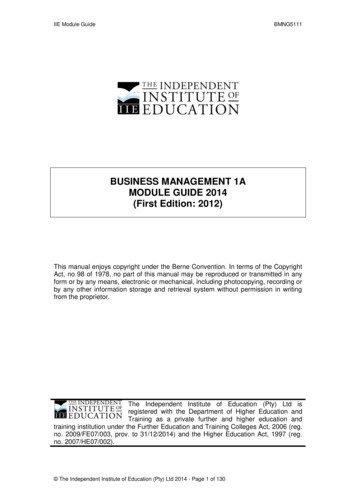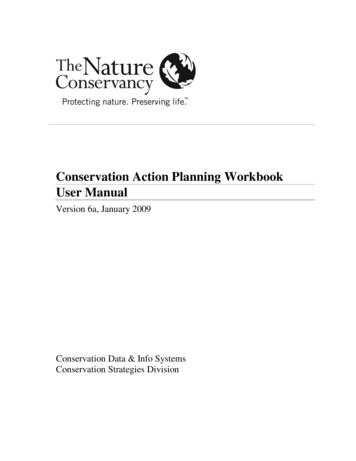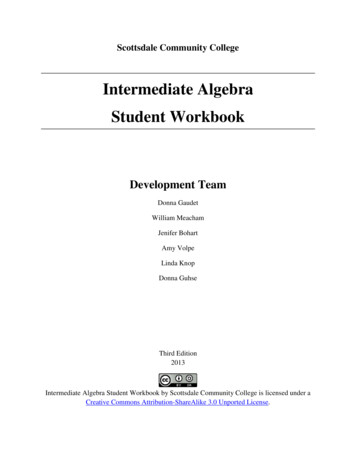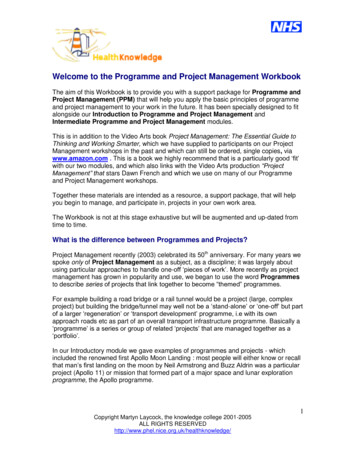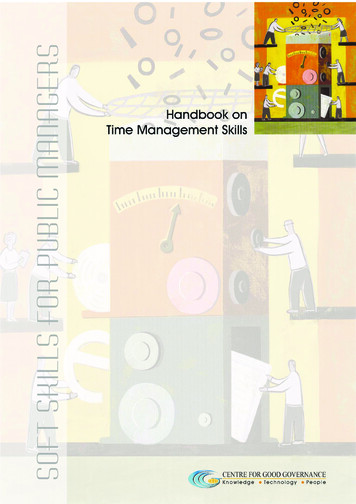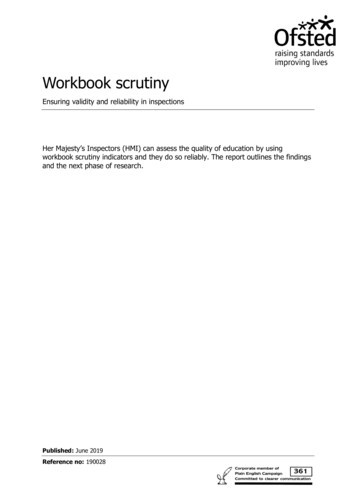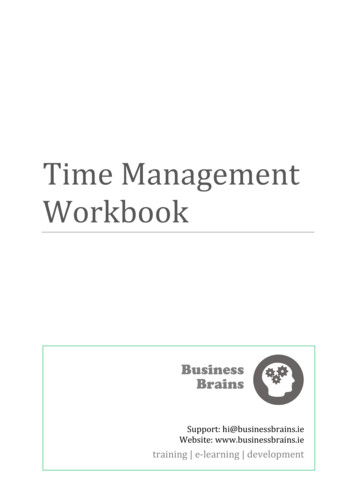
Transcription
Time ManagementWorkbookBusinessBrainsSupport: hi@businessbrains.ieWebsite: www.businessbrains.ietraining e-learning development
Time Management WorkbookTime Management WorkbookTake a moment to complete the exercises in this workbook before the Time Management usingOutlook course. Only you will see the answers in your workbook and you will not be asked to shareany personal information.However, you will use your answers on the day as you implement your time management plan inOutlook.CONTENTS1234Where did my time go? The Time Log . 21.1How it works . 21.2Now take action! . 21.3Time Log Template . 4Interactions vs. Interruptions. 52.1Sample Interruptions Log . 52.2Now take action! . 6What matters in your life . 73.1How it works . 73.2Take action now!. 8Five Monkeys . 94.15Questions . 9Time Management Questionnaire . 105.1Results . 11 Business Brains 2013 1
Time Management Workbook1 WHERE DID MY TIME GO? THE TIME LOGGet the big picture of how you actually spend your time with the Time Log.1.1 HOW IT WORKS Use the template and examples given below or adapt to yourneedsList General Categories for how you spend your time as columnse.g. Meetings, Email, PhoneEach time you complete an activity, enter it into the log with thecurrent time.Rate each activity A to E (where A is very important and E is awaste of time)Complete one log per day and repeat for at least 2 days in a row or, even better, for a wholeweek. It is a worthwhile investment of your time, don’t look for excuses!1.2 NOW TAKE ACTION! Add up the time spent in each category (column) at the bottom of the log for each day.Compare the relative importance of each category (% row) in your day.What surprises you the most about how you spent the day?What action can you take to make sure time is spent in a worthwhile manner? After two days or a week of logs, add up the time spent in minutes under each rating (A toE)ABCDEDay 1Day 2Day 3Day 4Day 5Total Time(minutes)Relative Time(%) Business Brains 2013 2
Time Management WorkbookIf you were to spend most of your time doing As and Bs, how would you deal with C, D, E tasks?CDEIf it was possible to delegate some of the above tasks, which tasks would you delegate? To whom?Task to DelegateTo WhomPotential IssuesPotential Solutions Business Brains 2013 3
Time Management Workbook1.3 TIME LOG TEMPLATEDate: Start time: gDurationCatch ? Business Brains 2013 ?4
Time Management Workbook2 INTERACTIONS VS. INTERRUPTIONS“If you want to manage it, measure it.” An interruptions log captures interruptions as they occur.When you look back at your day, you will be able to identify sources of interruptions and put in placepractical solutions.How it works Capture interruptions as they occur; use the template andexamples below or create your own log.Note the time, duration and cause.Give each interruption a rating from A to E (A: theinterruption was worth it to you, E: not worth it at all).Note personal interruptions as well as phone and emailinterruptions during the day.2.1 SAMPLE INTERRUPTIONS LOGDateTimeWhoLength(minutes)WhatRating7 April10:32MailProjectconfirmation6A7 April10:55JaneSports andSocial Night25E Business Brains 2013 5
Time Management Workbook2.2 NOW TAKE ACTION!Which interruptions were worthwhile?Which interruptions were the least worthwhile?How will you manage both good and bad interruptions more effectively? Business Brains 2013 6
Time Management Workbook3 WHAT MATTERS IN YOUR LIFEManaging your time – and using the tools inthis workbook – depends very much on what isimportant to you. Stephen Covey’s Habit 2:Begin with the End in Mind reminds us to lookat what we want to achieve in life before weset off to plan for it. It is useful to look at thedifferent areas of your life e.g.3.1 HOW IT WORKS List each area in your life or use thesuggested areas in this table.For each area, name the roles you playe.g. in Family you may be a parent aswell as a spouse and a childFor each role, write what you want(your goals)Finally, to achieve what you want,break it into projects you need to carryoutProfessionalSpiritualSocial /CommunityFamilyIntellectualHealthFinancialLook at the example in this table.AreaFamilyProfessionalWhich roles matter toyou?I am a DaughterI am a GirlfriendI am a GranddaughterI am my own personI am a Team memberon Project AWhat do you want to achieve?I want to support my parents asthey get older and show myappreciation to themI make valuable contributionswhich get me noticedWhat project(s)support this goal? Create occasionsto spend timetogether Plan for the futureand have difficultconversations Organise Christmasdinner this year List areas where Ican make acontribution andlist my skillsHave monthlymeetings with mymanager to discussmy interests,achievements anopportunities Business Brains 2013 7
Time Management Workbook Run weekly projectstatus updateswith entire teamDevelop projectmanagement skillsthrough coursesand on-the-jobexperienceI am a ColleagueI am a Manager3.2 TAKE ACTION NOW!Complete the table for Professional and at least another area of your life. Continue with other areasas needed.AreaWhich roles matter toyou?What do you want to achieve?What project(s)support this goal?ProfessionalFamily Business Brains 2013 8
Time Management Workbook4 FIVE MONKEYSStart with a cage containing five monkeys. Inside the cage, hang a banana on astring and place a set of stairs under it. Before long, a monkey will go to thestairs and start to climb towards the banana. As soon as he touches the stairs,spray all of the monkeys with cold water.After a while, another monkey makes an attemptwith the same result - all the monkeys aresprayed with cold water. Pretty soon, whenanother monkey tries to climb the stairs, theother monkeys will try to prevent it.Now, turn off the cold water.Remove one monkey from the cage and replace it with a new one. Thenew monkey sees the banana and wants to climb the stairs. To hissurprise and horror, all of the other monkeys attack him. After anotherattempt and attack, he knows that if he tries to climb the stairs, he willbe assaulted.Next, remove another of the original five monkeys and replace it with a new one. The newcomergoes to the stairs and is attacked. The previous newcomer takes part in the punishment withenthusiasm. Again, replace a third original monkey with a new one. The new one makes it to thestairs and is attacked as well. Two of the four monkeys that beat him have no idea why they werenot permitted to climb the stairs, or why they are participating in the beating of the newest monkey.After replacing the fourth and fifth original monkeys, all the monkeys that have been sprayed withcold water have been replaced. Nevertheless, no monkey ever again approaches the stairs.4.1 QUESTIONSWhy not? Why does no monkey ever approach the stairs anymore?What does that story teach us about how we do things? Business Brains 2013 9
Time Management Workbook5 TIME MANAGEMENT QUESTIONNAIRESource: unknownThe following questionnaire is designed to help you identify some of your personal habits and traitsin relation to time management. To get the best value from the questionnaire, be as honest as youcan, and think of examples in your workplace to help you decide on the most appropriate answer.Please mark YES or NO in response to each of the following. (Mark YES when the answer isfrequently or always yes, and NO when the answer is frequently or always no).There is a full explanation for each question and its answer on the following pages.Please do not refer to this until after you have finished scoring your answers.Do you:1. Undertake work as it appears, rather than in order of priority?2. Accept unimportant interruptions when working on an urgent task?3. Say “yes” to work requests even when unsuitable or unreasonable?4. Put off tasks which are daunting or uninteresting?5. Allow your work surroundings to become disorganised and messy?6. Complete work yourself which should be delegated to subordinates?7. Accept work requests, which are really someone else’s responsibility?8. Rarely take proper breaks at work?9. Deal with the same material several times, when it should have beendealt with in one sitting?10. Regularly take work home with you on evenings/weekends?11. Give subordinates very little feedback on their performance (positiveas well as negative)?12. Not trust your subordinates with various tasks, in case they makemistakes?13. Maintain an inadequate filing system (can never find things)?14. Waste considerable time on unimportant phone calls/literature?15. Often assign work to “Pending” category when it should be dealtwith on the spot?16. Keep an excessive (or inadequate) amount of paperwork?17. Often have disorganised, unnecessarily long or overly frequentmeetings?18. Lack certain skills or equipment which could be reasonably acquiredand result in considerable time saving?19. Neglect to communicate essential information to your staff?20. Have considerable difficulty making decisions?21. Allow your subordinates to become too dependent on you and notencourage them to use their own initiative?22. Not give your staff the training needed to carry out their jobeffectively?23. Work as a “fire fighter” or “crisis” manager, by responding toissues/crises as they arise, rather than taking time to establish goals andcreatively seek the best ways to achieve these goals?24. Frequently lack the concentrative powers to see tasks through to theend?YesNo Business Brains 2013 10
Time Management Workbook25. Spend an unnecessarily long time drafting correspondence,completing reports, etc. because of perfectionist tendencies or fears ofinadequacy?26. Not assertively express thoughts and suggestions for improving workeffectiveness for fear of rejection, disapproval or “rocking the boat”?27. Let your career path just “happen” rather than taking positive stepstowards achieving desirable and realistic life goals?How many YES did you score?5.1 RESULTSWhile every YES answer represents some potential for improvement, a couple of YES responses maybe the result of matters beyond your control, e.g. Questions 18 and 20.Generally speaking, the results of the questionnaire can be interpreted as follows:0–2Congratulations! Others can learn from your positive time management techniques.3–8Reasonable, but no cause for smugness! Start working on those YES responses.7 – 11Don’t feel sorry for yourself having such a heavy workload until you have brought thisscore down to the first category. (0 – 2).12 – 18It really is time you managed your time more effectively! Go through this manual atregular intervals and make those necessary changes.Over 18Really! You urgently need to make changes.INTERPRETATIONYou are encouraged to look closely at every YES response, in order to determine where your greatestareas of potential are for improving your time management skills.1. UNDERTAKING WORK AS IT APPEARS, RATHER THAN IN ORDER OF PRIORITY.This is one of the most common sources of poor time management. Many of us work in a haphazardmanner, too busy trying to cope with whatever comes our way to invest a few minutes daily inestablishing our work priorities. It reminds me of a story of the wood chopper who was so busytrying to chop down trees with his very blunt axe, that he complained he could never manage thetime to sharpen his axe. In a similar manner, so many of us work ineffectively, yet we complain thatwe do not have the time to improve our effectiveness through learning better time managementand other stress reducing techniques.Setting PrioritiesWrite down all those tasks which need to be done. Identify them by importance and urgency. If atask is urgent but trivial, give priority to it, but ensure that you do not spend any more time on itthan you need to. A task that is both urgent and important should naturally be given high priority.Do not make the very common mistake of spending your time on less important and non-urgent Business Brains 2013 11
Time Management Workbooktasks simply because you enjoy doing them or because the most urgent and important tasks appearboring and daunting!2. ACCEPTING UNIMPORTANT INTERRUPTIONS WHEN WORKING ON AN URGENT TASK.Many tasks require concentrated effort and there is nothing more frustrating than a barrage ofrelatively unimportant interruptions when you are trying to complete an urgent report or someother task requiring considerable concentration. People who complete a time log over a week’sduration are often astounded at how much time is wasted through unscheduled and unimportantinterruptions. Naturally, we cannot avoid all unscheduled interruptions, but we can often take stepsto improve the situation.Firstly, practice being assertive with those people who are insensitive to signs or hints that you arevery busy. Saying “Sorry, Ian I don’t have time to talk now, because I have an urgent report tocomplete” can save considerable time and bottled up tension on your part. If you wish to workuninterruptedly, advise your secretary or the switchboard operator that you will be unavailable foranything but the most urgent phone calls. If you have your own office, a closed door is also areasonable indicator that you do not wish to be disturbed, although there are always a few whochoose to ignore this sign. Sometimes it can help to set aside certain times each day forconsultations and phone calls. It can also be useful to schedule some uninterrupted time for highpriority tasks each day, picking those times (usually early in the morning) at which you operate mosteffectively.3. SAYING ‘YES’ TO WORK REQUESTS, EVEN WHEN UNSUITABLE OR UNREASONABLE.As Edwina C Bliss (“Getting Things Done”) states, perhaps the most effective of all the time savingtechniques ever developed is the frequent use of the word “no”. Being able to say “no” (even toone’s boss at times) is an assertion skill which can, and should, be developed.4. PUTTING OFF TASKS WHICH ARE DAUNTING OR UNINTERESTING.Too many of us are experts at procrastination, but keep postponing doing something about it. AlbertEllis maintains that many of us act upon the irrational belief that it is easier to postpone doingsomething daunting or unpleasant than to tackle it immediately. Such a belief is irrational becauseputting off daunting or unpleasant tasks only magnifies the problem – a molehill can become averitable mountain in our own mind and through procrastination, we can help to make tasksbecome more difficult than they would have been had we tackled them immediately. So often we letthe power of negative thinking make a task appear more unpleasant or difficult than it is in reality.When a problem seems enormous or overwhelming, it can be helpful to try and cut it down to amore realistic size. One effective way to cut the problem down to size is to divide it into moremanageable parts and then tackle these tasks one at a time.5. ALLOWING YOUR WORKING SURROUNDINGS TO BECOME DISORGANISED AND MESSY.The problem with a disorganised and messy work environment is that it can create frustration, asense that you are not getting anywhere with your work and also be distracting when you are tryingto concentrate on particular tasks. In addition, significant time can be wasted looking for itemswhich should normally be easily located. In this respect, an efficient filing system can make a big Business Brains 2013 12
Time Management Workbookdifference and while everything else often tends to get precedence over filing, it is an important taskand should be carried out systematically.6. COMPLETING WORK YOURSELF WHICH SHOULD BE DELEGATED TO SUBORDINATES.As stated earlier in the manual, many managers have problems with this one, for a variety ofreasons. Some do not trust their subordinates with jobs of any importance, for fear of possiblemistakes. Others will be reluctant to pass on any work involving prestige, challenge or enjoymentand will only delegate those jobs seen as boring or routine. Sometimes managers will not delegatetasks because they consider themselves to be able to complete those tasks more quickly andeffectively. Some managers will not delegate because they are not prepared to spend the necessarytime ensuring their subordinates understand what is required and providing assistance whereneeded. Other managers are not sufficiently assertive, being fearful of subordinates’ negativeresponses to being given more work. Sometimes your subordinates may not respond as positively toyour attempts at delegation as you would like. It may be that they are lacking in confidence and agood deal of demonstrated trust and support is needed on your part. They may have fear of failure,fear of being criticised by yourself or others if they do not perform adequately, or they maycomplain (justly or unjustly) that they do not have the time, knowledge or resources to complete thetask you wish to delegate. In some instances, a subordinate may be just plain lazy and yourassertiveness is needed to ensure the work is done. In delegating work and assessing itsperformance, it is important to be able to give negative or positive feedback, depending on which isappropriate. Unfortunately, too many managers are adept at giving the former, but not the latter.Both have their place.7. ACCEPTING WORK REQUESTS, WHICH ARE REALLY SOMEONE ELSE’S RESPONSIBILITY.Refer again to the comments made in relation to Question 3. The ability to say “no” is important,even if this applies to jobs inherited by you in a new position which are not rightfully yourresponsibility. If you are uncertain about whether certain work requests are your responsibility,check your job description or discuss the matter with your superior.8. RARELY TAKING BREAKS AT WORK.When you are grossly “overworked” it is tempting to cut out all breaks, including lunch, morning andafternoon tea. However, none of us can work effectively for 8 – 10 hours without a break and for thesake of both our sanity and effectiveness, we need to take reasonable breaks. Even a quick, briskwalk, some isometric or yoga exercises or a few minutes meditation/relaxation can often give yourmind and body the break they need.9. DEALING WITH THE SAME MATERIAL SEVERAL TIMES, WHEN IT SHOULD HAVE BEEN DEALT WITHIN ONE SITTING.Are you sometimes guilty of starting a task, spending some time on it and then baulking at thecomplexity of the task or difficulty of the decision(s) to be made, you throw it in the “pending” trayor back to the in-tray? Many of us repeat this process over and over again, preferring to devote ourenergies to easier or more interesting tasks and waste considerable time in the process of doing so.Whenever possible, finish whatever you start. If a task is too large to be completed in one sittingthen attempt to break the task into identifiable and manageable portions and complete one or more Business Brains 2013 13
Time Management Workbookof these portions at a time. This rocedure creates a great feeling of accomplishment and involvesless waste of time re-orienting yourself each time you return to the task.10. REGULARLY TAKING WORK HOME WITH YOU ON EVENINGS OR WEEKENDS.It is very easy to get caught up in the habit of regularly taking work home with you on weekends andevenings. In so doing, it may be appropriate to ask yourself a few questions:“If I managed my time more effectively, would this still be necessary?”“Am I continually putting my work ahead of my family and/or friends as a priority?”“Has work become an escape from a certain unpleasant or difficult situation (e.g. difficulties with aspouse?) If so, is it making the situation worse?”“Has work become a means of filling a void in my life?” “Am I addicted to work because it basicallyprovides the sole basis of meaning to my life?”“Am I driven by the need to prove myself to be indispensable, or be somewhat of a martyr?”I don’t wish to suggest that taking home work with you on a regular basis is a sin. Rather, it isimportant for you to question management of your time, the priorities in your life and the reason foryour behaviour, if work is continually depriving you of most of your leisure time.11. GIVING SUBORDINATES VERY LITTLE FEEDBACK (POSITIVE AND NEGATIVE) ON THEIRPERFORMANCE.You will be able to manage your own time more effectively if your subordinates are doing their jobsproperly. Being human, we all make mistakes at times and it is important to provide yoursubordinates with negative feedback when mistakes are made. However, there are different ways ofdoing this. Giving negative feedback in a loud, aggressive manner to a subordinate in the presence ofother colleagues is not the best way. Furthermore, positive reinforcement is a more powerfulmotivator for getting the best out of your staff than negative reinforcement. Let them know whenthey have performed a task well and you can be sure they will want to continue performing well.12. NOT TRUSTING SUBORDINATES WITH VARIOUS TASKS IN CASE THEY MAKE MISTAKES.As stated earlier, your subordinates are human and therefore have every likelihood of makingmistakes occasionally (don’t you?). However, they will not develop new skills and self confidenceunless you provide them with learning opportunities. The chances of your subordinates makingmistakes are lessened if you give clear instructions and appropriately monitor progress on anydelegated tasks (this does not mean breathing down their necks all the time). It is obviouslyimportant to give your staff tasks which match their capabilities and skills (or capacity to acquirenew skills).13. NOT REQUESTING EXTRA STAFF OR RESOURCES EVEN IFEXTREMELY NECESSARY.Some of us suffer from a martyr complex, being determined to tackle an exorbitantly high work loadfor extended periods, even if it kills us (it sometimes does). Others have poorly developedassertiveness skills and are not prepared to make a case for extra resources, even when there is acrying need for them. Inadequate staff or resources can often occur if an organisation is eitherrapidly expanding, with increased workload not being matched by increased staff numbers, orexperiencing difficult times (a reduced number of staff being required to cope with the same Business Brains 2013 14
Time Management Workbookworkload). You owe it to your staff and yourself to request extra resources if your section isoverworked and there is some likelihood (however small) of obtaining additional resources.14. WASTING CONSIDERABLE TIME ON UNIMPORTANT PHONE CALLS/LITERATURE.The best way to determine how much time is wasted on unimportant phone calls and literature is tokeep a time log for a week. Like many others, you may be surprised at how much time you can saveby being more disciplined in this respect. If an abundance of glossy, relatively unimportantmagazines and reports passes over your desk each week, consider reading them while going to andfrom work or during breaks.Alternatively, your secretary (if you have one) can be instructed to peruse such literature and markany relevant items for your attention. Likewise your secretary can also be directed to pre-screentelephone calls thus saving you the time of having to attend to unnecessary ones.15. ASSIGNING WORK TO “PENDING” CATEGORY, WHEN IT SHOULD BE DEALT WITH ON THE SPOT.The danger with a “pending” tray is that it can become the easy way out – you consequently delaymaking decisions that could be made immediately. Avoid the temptation to develop a massive“Pending” tray (or one at all, for that matter) by making immediate decisions on all incoming mailand tasks, as indicated in the response to Question 9.16. KEEPING AN EXCESSIVE (OR INADEQUATE) AMOUNT OF PAPERWORK.Several years ago, the British retail chain, Marks and Spencer, led a war on excess paperwork, byscrutinising all procedures and relying on the motto “if in doubt throw it out”, to dispense with anyunnecessary paperwork. Within a year 120 tons of forms, sheets, cards, etc were thrown out by thefirm and the subsequent emphasis on simplified procedures appeared to be at least partlyresponsible for the substantial profit improvements in the following years.17. OFTEN HAVING DISORGANISED, UNNECESSARILY LONG OR OVERLY FREQUENT MEETINGS.The fact that films are made on this specific topic by John Cleese and other celebrities, indicates thatmeetings can be significant time wasters. While well organised, properly directed meetings can behighly effective, the reverse is also true. Some important questions relevant to whether or notparticular meetings are effective are:Are they really necessary or have they become a substitute for action?Are agendas concise, specifically indicating areas to be covered and the decisions needing to bereached? Are they sent to all meeting participants sufficiently in advance of the meeting?Do meetings start and finish at the schedules times?Are decisions made and responsibilities assigned, whenever possible, for each item covered in themeeting? Are all participants quite clear about these decisions and responsibilities?Are concise minutes of each meeting sent within a reasonable time?Do you need to attend the meeting or can this responsibility be delegated?Have the meetings ceased to serve the purpose for which they were originally established?Does the meeting comprise of an appropriately sized group and do all participants have a chance tocontribute, or do one or two people tend to dominate the meetings? Business Brains 2013 15
Time Management Workbook18. LACKING CERTAIN SKILLS OR EQUIPMENT WHICH COULD BE REASONABLY ACQUIRED ANDRESULT IN CONSIDERABLE TIMESAVING.The last twenty years have seen tremendous changes in the workplace, with most offices now usingstandard equipment that did not exist two decades ago. A large variety of electronic and computingequipment is now within reach of all businesses and there is no excuse for not taking advantage of atleast some of these time saving devices. More and more managers have found basic keyboard skillsto be of great use, and their subordinates would also do well to upgrade their report writing andletter writing skills. One final point – many people carry a portable tape recorder and use this on theway to and from work to record ideas, letters for typing and so on or simply to learn a language orlisten to inspiring tapes.19. NEGLECTING TO COMMUNICATE ESSENTIAL INFORMATION TO YOUR STAFF.As a manager, you will be in frequent receipt of information which is not normally accessible to yourstaff. It is very easy to overlook the importance of providing your staff with such information.Keeping your staff informed, either on an informal basis or through say, weekly meetings, will notonly keep them in touch with organisational developments, but will also positively motivate them intheir work, as it will give them an increased sense of being part of the team.20. HAVING CONSDERABLE DIFFICULTY MAKING DECISIONS.If you fall within this category, bear in mind that continual indecision might have worserepercussions than abiding by a decision and subsequently discovering that your rejected alternativewas preferable after all. If finding it hard to make a particular decision, you may benefit by askingyourself the following questions:Have I made this decision bigger and more stressful than it needs to be? What is the worst thing thatcan happen if I make the wrong decision?Do I have an exaggerated fear of failure? Do I always tend to imagine the worst possible scenariohappening? How often does the worst scenario happen and to what extent am I encouraging it withmy negative thinking?Is my indecision related to my difficulty in being assertive with those people who will be affected bythe subsequent decision?Have I properly explored the various possible solutions for this problem or am I caught in a rigid lineof thinking?What decision would a totally objective person make?Some decisions are obviously more important and have more far-reaching consequences thanothers. Such decisions will need more careful consideration of the various possible consequencesthan would more trivial decisions. Ultimately, however, there is no substitute for action! Business Brains 2013 1
Time Management Workbook Take a moment to complete the exercises in this workbook before the Time Management using Outlook course. Only you will see the answers in your workbook and you will not be asked to share any personal information. However, you will use your answers on the day as you implement your t

